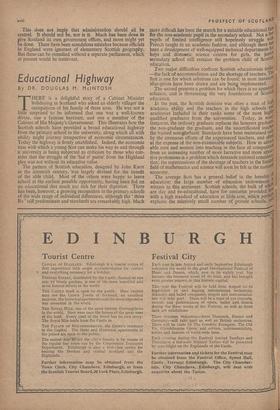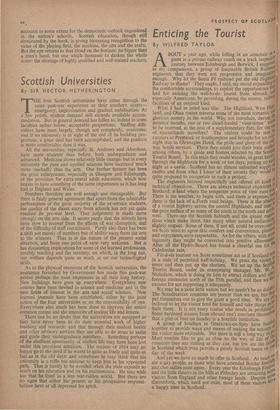Educational Highway
By DR. DOUGLAS M. McINTOSH The pattern of Scottish education, designed by John Knox in the sixteenth century, was largely devised for the benefit of the able child. Most of the others were happy to leave school at the earliest possible opportunity, having been fed on an educational diet much too rich for their digestion. There has been, however, a growing recognition in the primary schools of the wide range of individual differences, although the 'three Rs 'still predominate and standards are remarkably high. Much PROSPECT Of SCOTLANO more difficult has been the search for a suitable educational fall for the non-academic pupil in the secondary school. Not a fe.shv pupils of limited intelligence still hopelessly struggle it French taught in an academic fashion, and although there 113' been a development of well-equipped technical departments for boys and domestic science centres for girls, the junior secondary school still remains the problem child of Scottish education. Two major difficulties confront Scottish. educationists todaY —the lack of accommodation and the shortage of teachers. The, first is one for which solutions can be found; in most instance' blue-prints have been drawn and are being implemented. t The second presents a problem for which there is no apparea solution, and is threatening the very foundations of Scottish education.
In the past, the Scottish dominie was often a man of 11',TA academic ability and the teachers in the high schools an,' academies included in their ranks some of the most higlu,,Y m qualified graduates from the universities. Today, in man, Instances, the ordinary graduate replaces the honours graduate' the non-graduate the graduate, and the uncertificated teachef the trained non-graduate. Standards have been maintained 0111),, by the strenuous efforts of the experienced teachers, and oft°, at the expense of the non-examinable subjects. How to attrac,' able men and women into teaching in the face of competitio' from an increasing number of more lucrative and more attrae' tive professions is a problem which demands national conside0,4' tion; the repercussions of the shortage of teachers in the limitel field of mathematics and science will soon be felt in the nation3' 'accounts to some extent for the democratic outlook engendered in the nation's schools. Scottish education, though still dominated by the book, is giving increasing recognition to the value of the playing field, the machine, the arts and the crafts. But the eye returns to that cloud on the horizon, no bigger than a man's hand, but one which threatens to darken the whole scene: the shortage of highly qualified and well-trained teachers,



































































 Previous page
Previous page